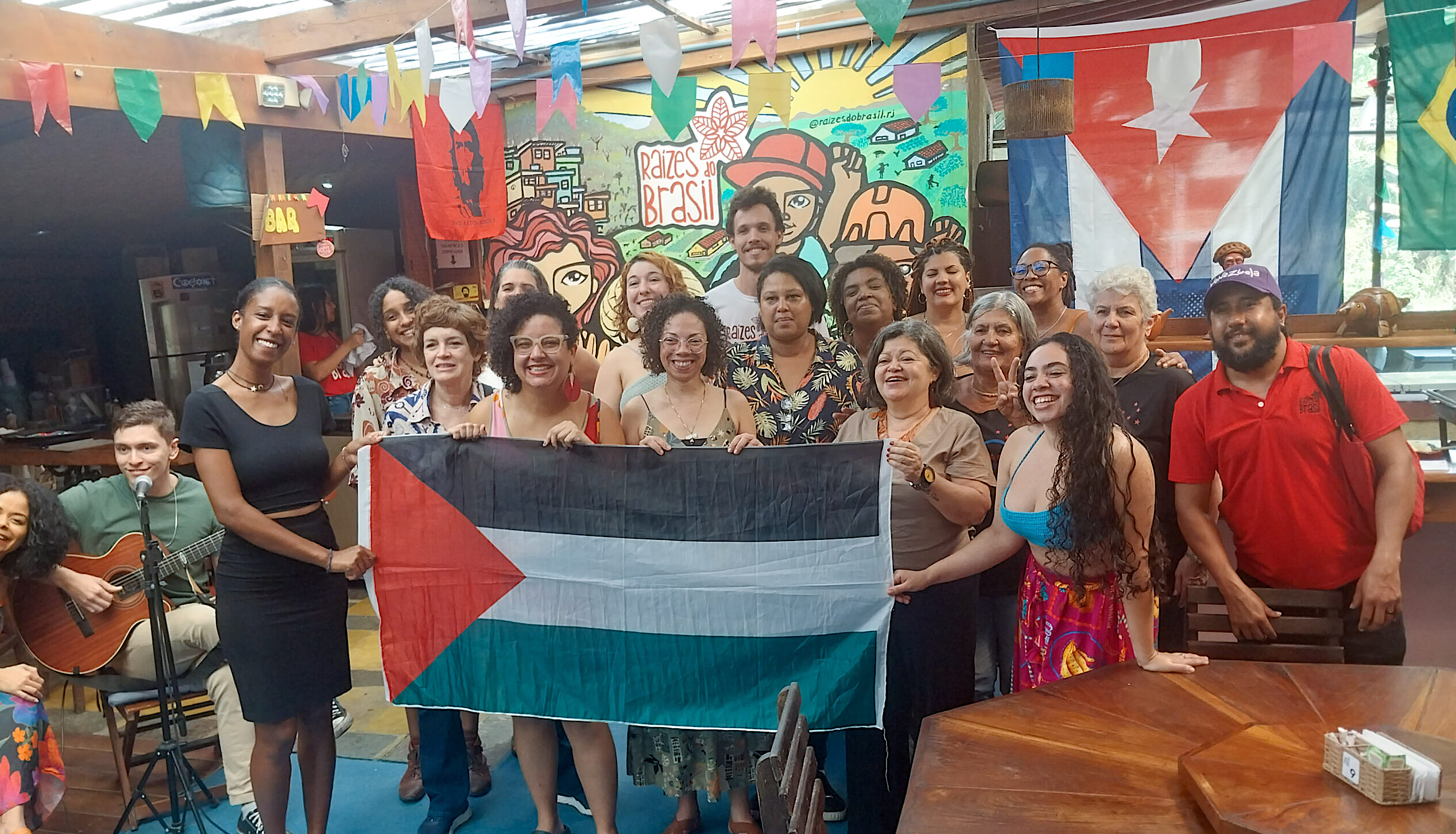
Clique aqui para Português
On Saturday, July 27, the ninth edition of Black July took place over a traditional countryside breakfast at Raízes do Brasil, space of the Small Farmers’ Movement (MPA) in Santa Teresa, a neighborhood in Central Rio. The event featured conversation circles led by Black women from favelas and peripheries.
Since 2016, Black July has brought together groups from nations around the world, including Brazil, Palestine, Haiti, Mexico, Chile, Honduras, Colombia, Argentina, India, South Africa, and Kenya, as well as Black Lives Matter from the United States, as international partners fighting in their respective regions against racism, militarization, and apartheid.
In Rio de Janeiro, the initiative is led by favela movements and mothers of victims of police violence, with the goal of denouncing State-sponsored terrorism in their communities. Its main objective is to connect these local struggles to create an international solidarity network to confront the localized effects of racism, colonialism and the militarization of life in peripheral contexts.
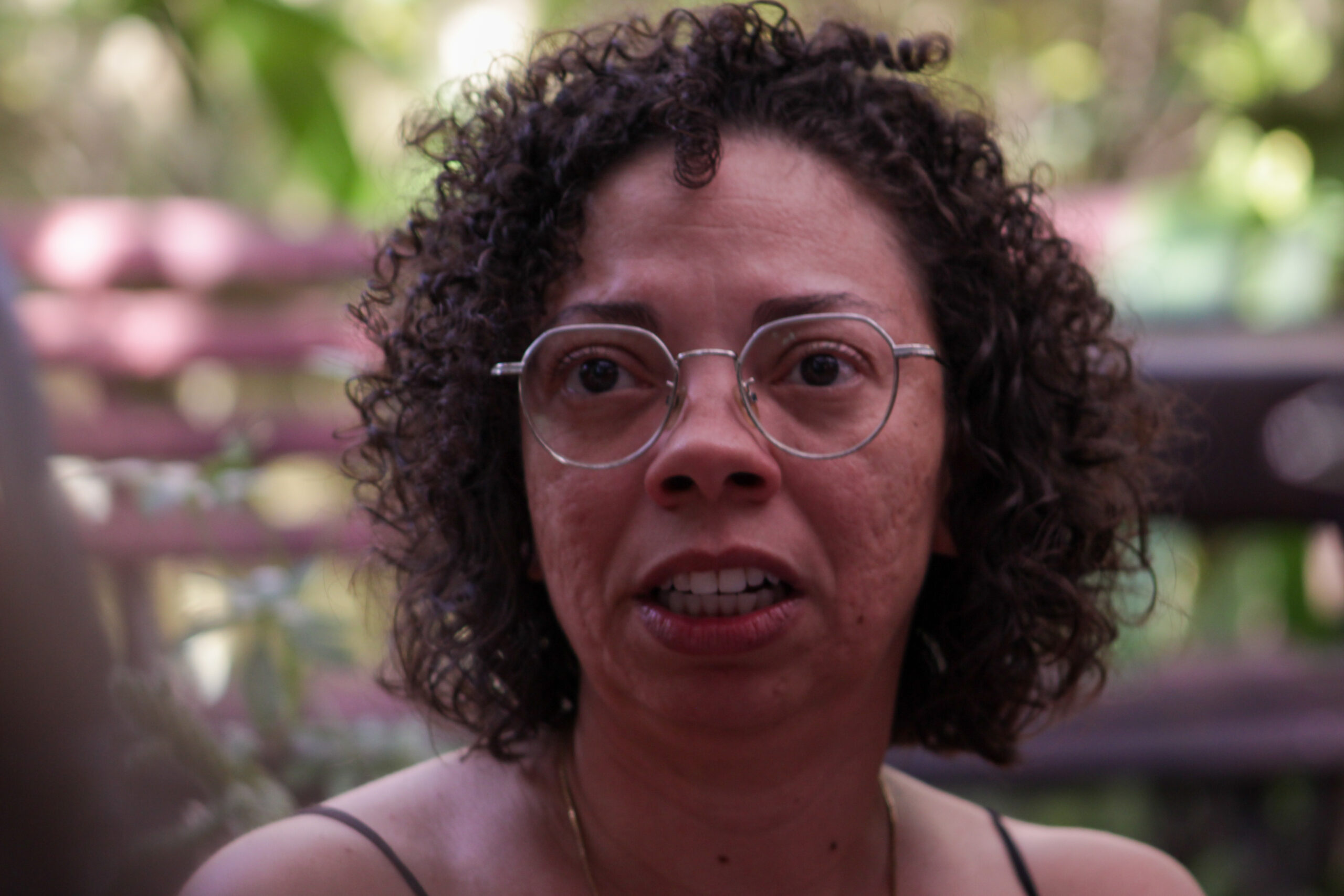
The event that marked 2024’s Black July was a discussion circle conceived and organized by favela journalist and activist Gizele Martins, born and raised in the Maré cluster of favelas in Rio’s North Zone. Martins is a prominent figure in grassroots journalism and Rio’s favela movements.
The discussion group included Patrícia de Oliveira, a member of the Network of Communities and Movements Against Violence; peri-urban farmer Juliana Wu, from the Terra Prometida settlement in Duque de Caxias, a municipality in Greater Rio’s Baixada Fluminense region; Cláudia Santiago Giannotti, one of the founders of the Piratininga Communication Center (NPC); representatives or members of the Small Farmers Movement (MPA) and community-based media initiatives, such as the newspaper Girls from Maré; and residents of favelas and other areas of the city interested in discussing the oppressions that continuously kill socioeconomically vulnerable racial minorities (and majorities) living in peripheral areas across the world.
“This is our 9th Black July and today we decided to have breakfast with Black women from favelas, who are examples of resistance in Rio de Janeiro, fighting against Black genocide, fighting for their territory, against arrests, but, above all, fighting for the right to life around the world. Black July aims to bring together worlds, struggles, and resistance globally.” — Gizele Martins
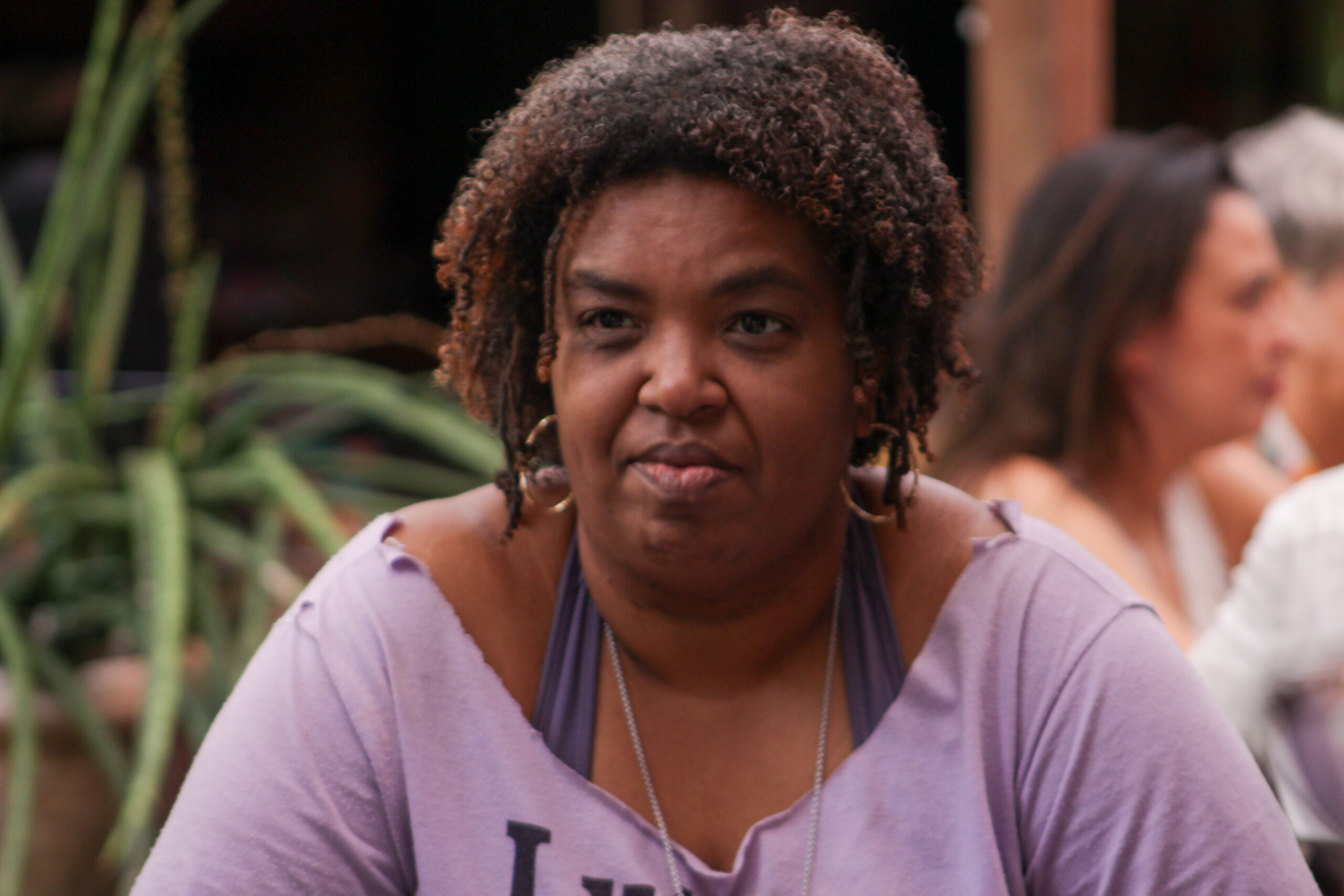
Simone Lauar, a grassroots journalist for the newspaper Girls from Maré and a mental health activist, emphasized the impact of violence and the coronavirus pandemic on Black women in these regions. She also highlighted how her project, Minds of Maré, was able to support favela women during the pandemic and continues to do so today.
“We’ve been working [with] Minds of Maré since 2020. Most of the people who seek psychological care are single moms, Black women from the peripheries and favelas. Many of them lost their partners during the pandemic because they had to work and ended up catching Covid-19… [Other women lost] their children [to violence] in the favelas. Many single mothers find it hard to support their children, so we put a lot of love into this project.” — Simone Lauar
Often, these women, mothers, daughters, aunts, sisters and grandmothers take on the responsibility of caring for their families, which leads to unemployment. According to data from 2021 published by the Brazilian Institute of Geography and Statistics (IBGE), while the unemployment rate for men is 9%, it is 13.9% for women.
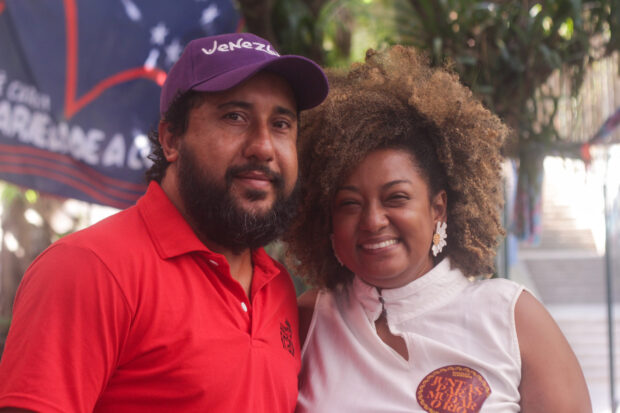
Rafaela Albergaria, a social worker and coordinator of the Trains Observatory, gave a talk on the importance of public policies, such as full-time daycare and other facilities that support mothers pursuing work and education.
“Talking about the right to the city means addressing full-time daycare so that Black women, who are the most affected by hunger, poverty, and unemployment, can access dignified work… Daycare from seven to two in the afternoon is not enough; it doesn’t reflect reality or provide dignity to Black women.” — Rafaela Albergaria
The venue chosen for the event was Raízes do Brasil, a space managed by the Small Farmers Movement (MPA) in Rio de Janeiro. The MPA focuses on small-scale rural farmers, family farming, organic food, and the notion that eating is a political act—one of the core principles of Black July.
“I came here to participate once again in Black July because there was an edition held in the settlement where I live, Terra Prometida, in [the Greater Rio municipality of] Duque de Caxias, and we noticed many intersections between rural and favela issues… So, whenever we [from the settlement] can, we participate in Black July because, in addition to the issue of racism, we also experience environmental racism. We are surrounded by [electric utility giant] Furnas and [government-owned oil multinational] Petrobras, yet we lack basic rights such as roads, electricity, or a healthcare system… none of these reach us.” — Juliana Wu
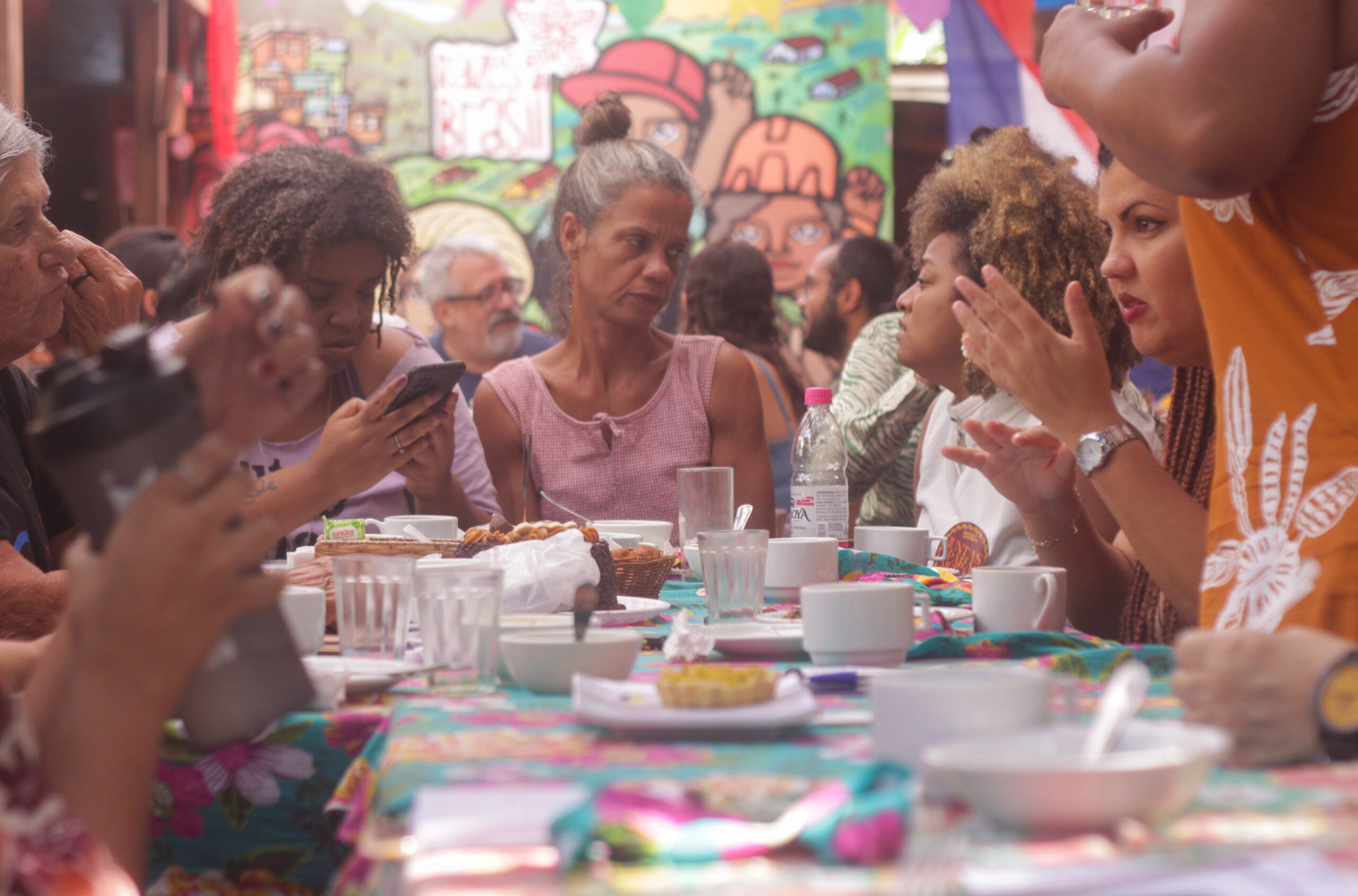
In 2024, the gathering marks its ninth year. Over these nine years, the Black July network has amplified the voices of those fighting for justice and equality around the world, from Rio de Janeiro to Palestine. Gizele Martins, who visited Palestine in 2023, is deeply involved in the cause of Palestinian liberation and contributed to the discussions by sharing her experience of visiting the Middle Eastern country, which suffers under a system of apartheid and accusations of genocide perpetrated by Israel.
“From Palestine I went to South Africa… I traveled by ship both ways… The crossing was so intense it reminded me of slave-holding ships… On the return journey, I went from South Africa to Namibia, and then back to Brazil… In South Africa, I met with leaders who are fighting for Palestine and who also fought against apartheid. I gave lectures in schools in Namibia about the connections between favelas and Palestine… We need to address the process of inventing the enemy. Here in Brazil, it’s Black people, favelas, indigenous people, quilombos, and social movements—we, the poor, are the enemy. In Palestine, the fabrication that they are terrorists is used as a justification for genocide and killing. The weapons used are the same, here and there.
The number of communicators and journalists murdered [in Palestine is staggering]… It’s one of the first genocides being live-broadcast globally. The Israeli army and police are among the most technologically advanced in the world when it comes to killing; they can recognize SIM cards, track Palestinian leaders through their cell phones, and kill them. There is a campaign in Palestine to use a cell phone for just one day, burn it, and then switch to a new one… If you’re a targeted leader, it’s only safe to keep a cell phone for a few hours. There are many similarities between our situations, though it’s obviously not the same. We are all witnessing the reality and destruction in Gaza [but it’s still comparable]… It’s shocking both here and there when children are murdered or arrested… In Palestine, children as young as three are sometimes arrested… It’s like giving your life for the olive tree, the water, the land.” — Gizele Martins
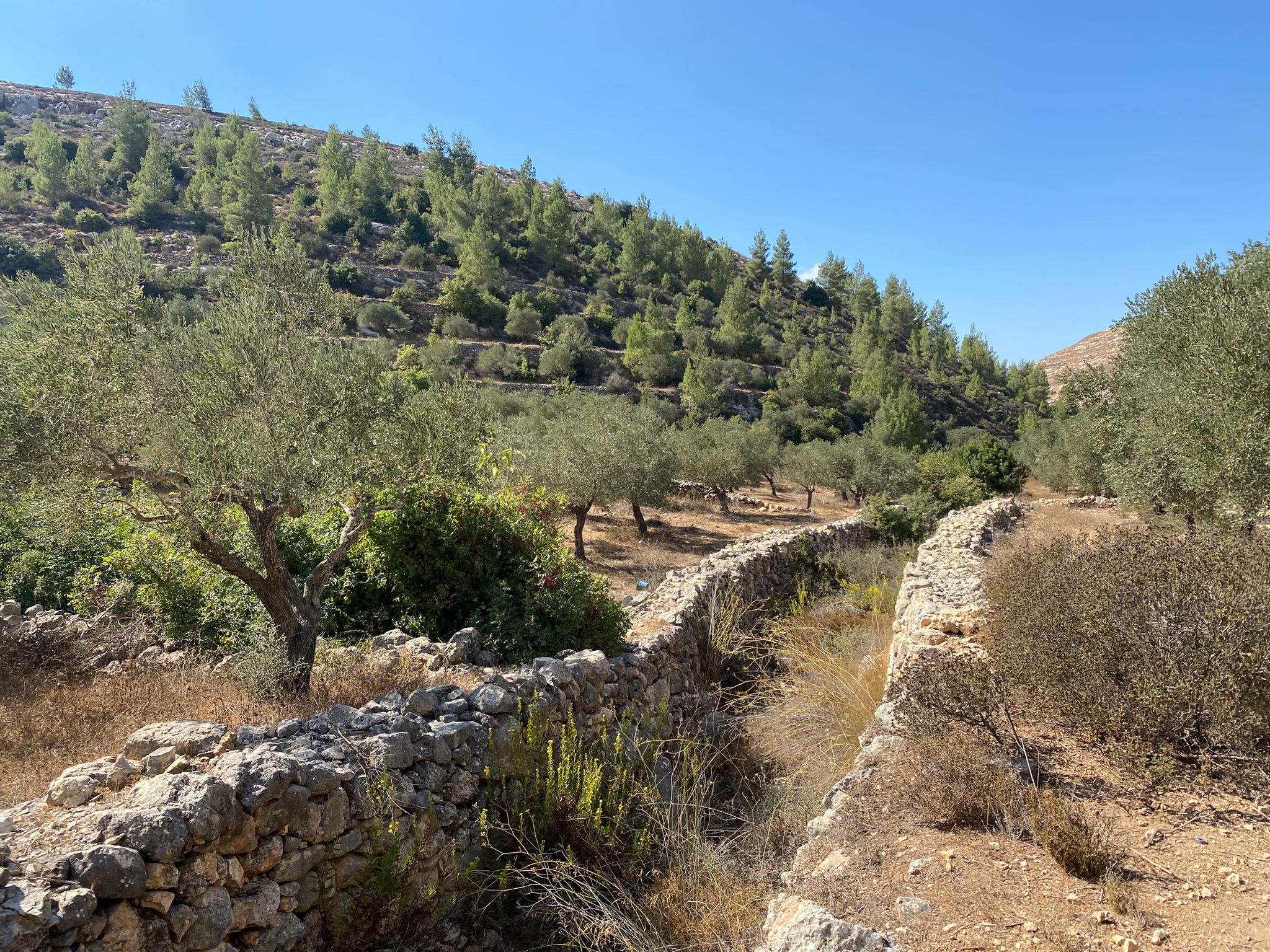
Patrícia de Oliveira, from the Network of Communities and Movements Against Violence, has also been to Palestine and shared her experiences with the group.
“We found people resisting in several places… The issue there is land… We went to a place where a family was almost burned alive because Israeli settlers set fire to Palestinian homes. A man from a nearby village came to help, trying to save someone, and ended up dying. He was shot in the head by an Israeli soldier when he tried to rescue the family’s grandmother from inside the burning house… We visited a 1948 refugee camp, and when we arrived, we saw that the local youth were organizing to take to the streets. The atmosphere was tense because the Israelis had killed a 10-year-old child. So, we couldn’t stay long because, once the movement starts, drones and Israeli soldiers’ cars follow… We also got caught in a shootout before heading to the airport. Our flight was at 6am, and we tried to leave at midnight, but the shooting was so intense that the driver decided to wait before leaving.” — Patrícia Oliveira
In 2024, the call for international solidarity from Black July was particularly focused on the people of the Gaza Strip, who have been resisting Israeli aggression since October 2023. According to a decision by the International Court of Justice (ICJ) regarding the lawsuit filed by South Africa, the situation in Gaza should be considered genocide. This assessment is reinforced by United Nations (UN) rapporteur Francesca Albanese, who cites reasonable grounds to believe that genocide is being perpetrated in Gaza. Therefore, more than ever, Palestine was a central topic in the Black July conversation.
Besides serving as a space for interaction, inspiration, and mutual support, Black July has been officially integrated into the agenda of social movements. It is celebrated as a moment of international solidarity among working-class communities, their life-affirming technical knowledge, and forms of resistance.
“I was very, very happy to see these people who… are my references for struggle and resistance. These are the people I’ve fought alongside for the 20 years I’ve been part of the favela movement. So, I was very happy to see them here, to listen to them, and to embrace them.” — Gizele Martins
About the author: Vinícius Ribeiro was born and raised in the West Zone of Rio, and currently lives in Mangueira. Journalist, cinematographer and photographer, he is a member of the Fotoguerrilha Collective. He is director and screenwriter of short films Sobreviver, Dame Candole, Sob o Mesmo Teto and Entregadores, and is currently involved with a project about the Uberization and precarization of labor.
About the author: Alice Machado, 24, a resident of Anchieta in Rio’s North Zone, is a social work student at State University of Rio de Janeiro (UERJ), a graduate in Popular Communication from the Núcleo Piratininga de Comunicação (NPC), and a photojournalist for independent media source Fotoguerrilha Collective.
